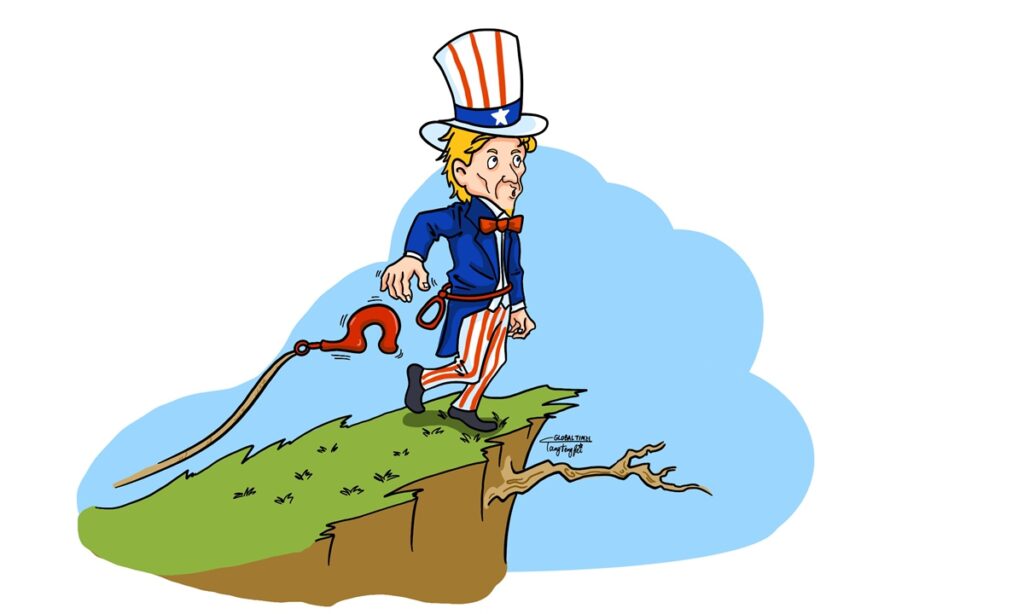The US Chamber of Commerce on Wednesday issued a report addressing the China-US economic relationship, warning hundreds of billions of dollars in potential losses for US businesses if a decoupling were to take place but also repeating accusations of China’s “unfair trade and regulatory practices” and calling for broader and multilateral policies to address the “China challenge.”
Over the past four years, the US, under former President Donald Trump, waged a trade war against China based on the same exact grievances the chamber is citing in the new report. US businesses have and continue to bear the brunt of the costly battle and they are fully aware of it, as indicated in the analysis, conducted jointly with the consultancy Rhodium Group.
The report said that if US foreign direct investment into China were reduced by half, the US would suffer a one-time GDP loss of up to $500 billion, and an annual GDP loss of $190 billion could occur if 25 percent tariffs are placed on all two-way trade. Additionally, the US could lose $30 billion annually if Chinese students and tourists were stopped completely.
Those figures should be no surprise to anyone who has been following the trade war over the past several years, particularly business both in China and the US. Serious policymakers, for whom the analysis is intended for, should also have been aware of those potential damages. US President Joe Biden, while running for the presidency, criticized Trump’s approach and spoke of the damage it could inflict on the US.
It goes without saying that data analysis is important for policymaking, as the chamber rightly pointed in the report. However, addressing the fundamental issue to avoid those hundreds of billions of dollars in losses in a rational and effective way requires a step further – the actual root cause of those issues behind the damaging policies under Trump.
For years, US business groups have been airing the same grievances over market conditions in China with accusations of unfair trade practices, all while many of them have enjoyed massive successes in the market. If there were specific unfair Chinese policies and actions targeting a specific US company, there are ways for them to address, in China or at the WTO.
But instead, US business groups including the US Chamber have been pushing the US government to crack down on China based on these broad, vague charges. Many in China believe that it was US business groups that were behind Trump’s trade war, in their relentless pursuit of profits.
Now, with Trump out and Biden in the White House, there is a real opportunity for the world’s two largest economies to drop the mutually destructive trade war and seek ways to work together. Unfortunately, the US Chamber is still advocating ways to clamp down on China based on the same grievances, though they are now pushing for a “plurilateral approach” that involves “our international partners” to address what it repeatedly called “China challenge.”
That begs the question: Is the US Chamber advocating for a trade war between US allies and China? For arguments sake, let’s assume that the US could mobilize all its allies to wage a war on China, how would that be in the interest of US businesses or businesses around the world? Does it actually think the cost would be smaller than the US’ war on China?
China has continued to roll out reforms to open up more sectors, to bolster intellectual property protection and ensure similar treatment to foreign companies. Many foreign businesses, including US firms, have been the winners from these reforms. Need evidence? Just look at this figure: China received $163 billion foreign FDI in 2020, the most of any country globally, surpassing for the US’ $134 billion, according to the UN. Would any firm come to invest, if China was so unfair and closed off?
It’s also important to note that while more and more foreign businesses are welcome into China with open arms, Chinese companies are facing crackdowns overseas, particularly in the US, which has imposed various restrictions or sanctions on hundreds of Chinese companies in almost all fields.
Indeed, the US Chamber did not advocate crackdowns on Chinese firms, but its constant and baseless accusations contribute to this increasingly out-of-control hostility to China and its businesses.
Chinese leaders have repeatedly vowed to push forward reform and welcome businesses around the world to conduct businesses in China. As far as the US Chamber is concerned, here is a word of wisdom from Confucius: Do not impose on others what you yourself do not desire!
The author is a reporter with the Global Times. bizopinion@globaltimes.com.cn
Illustration: Tang Tengfei/GT




